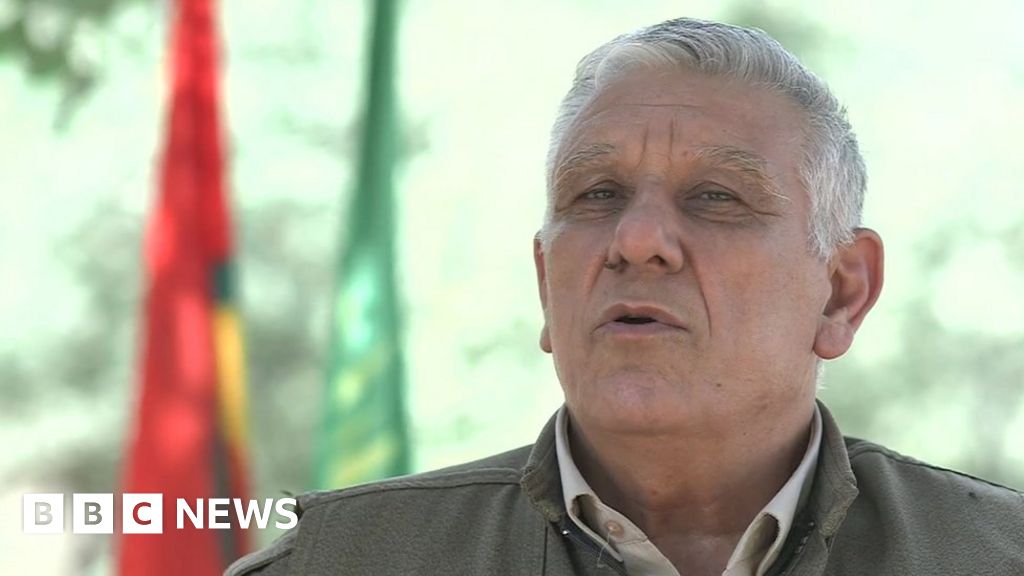Re: Regional geopolitics
PKK leader: Turkey is protecting IS by attacking Kurds
Cemil Bayik, is considered the most important figure of the PKK at the moment
The man leading the Kurdistan Workers Party (PKK) has accused Turkey of trying to protect the Islamic State group by attacking Kurdish fighters.
Cemil Bayik told the BBC he believed President Recep Tayyip Erdogan wanted IS to succeed to prevent Kurdish gains.
Kurdish fighters - among them the PKK - have secured significant victories against IS militants in Syria and Iraq.
But Turkey, like a number of Western countries, considers the PKK a terrorist organisation.
A ceasefire in the long-running conflict with the group appeared to disintegrate in July, when Turkey began bombing PKK camps in northern Iraq, at the same time as launching air strikes on IS militants.
Observers say PKK fighters have been on the receiving end of far more attacks than IS.
But Turkish officials deny that the campaign against IS group is a cover to prevent Kurdish gains. On Wednesday, Turkey said it was planning a "comprehensive battle" against IS.
'Stop Kurdish advance'
"The Turkish claim they are fighting Islamic State… but in fact they are fighting the PKK," Cemil Bayik told BBC's Jiyar Gol.
"They are doing it to limit the PKK's fight against IS. Turkey is protecting IS.
"[President] Erdogan is behind IS massacres. His aim is it stop the Kurdish advance against them, thus advancing his aim of Turkishness in Turkey."
Map: Kurdish populated areas in Turkey, Syria and Iraq
More than 40,000 people have been killed since the PKK began its armed struggle against the Turkish government in 1984.
In the 1990s, the organisation dropped its demand for a Kurdish state and instead called for more autonomy for the Kurds.
In March 2013, its imprisoned leader Abdullah Ocalan called a ceasefire.
But violence has resumed in recent weeks after a suicide bombing blamed on IS killed 32 people in the predominantly Kurdish town of Suruc.
The PKK's military wing killed two Turkish police officers, claiming they had collaborated with IS in the bombing.
Turkey says the group has been behind a number of other attacks.
When, on 24 July, Turkey officially launched its first airstrikes against IS, it also attacked Kurdish positions in northern Iraq.
Negotiations 'only choice'
Speaking to the BBC, Mr Bayik said negotiations were the "only choice" for an end to the Kurdish conflict.
He said the PKK would stop fighting if Turkey ended its military operation, and called for international monitors to oversee a ceasefire.
Turkish Prime Minister Ahmet Davutoglu has previously said that strikes against the PKK would continue until the group surrenders.
The country's fight with the PKK is complicating the US-led war on the Islamic State group, for which the US has relied heavily on Syrian Kurdish fighters affiliated with Turkey's Kurdish rebels.
PKK leader: Turkey is protecting IS by attacking Kurds
Cemil Bayik, is considered the most important figure of the PKK at the moment
The man leading the Kurdistan Workers Party (PKK) has accused Turkey of trying to protect the Islamic State group by attacking Kurdish fighters.
Cemil Bayik told the BBC he believed President Recep Tayyip Erdogan wanted IS to succeed to prevent Kurdish gains.
Kurdish fighters - among them the PKK - have secured significant victories against IS militants in Syria and Iraq.
But Turkey, like a number of Western countries, considers the PKK a terrorist organisation.
A ceasefire in the long-running conflict with the group appeared to disintegrate in July, when Turkey began bombing PKK camps in northern Iraq, at the same time as launching air strikes on IS militants.
Observers say PKK fighters have been on the receiving end of far more attacks than IS.
But Turkish officials deny that the campaign against IS group is a cover to prevent Kurdish gains. On Wednesday, Turkey said it was planning a "comprehensive battle" against IS.
'Stop Kurdish advance'
"The Turkish claim they are fighting Islamic State… but in fact they are fighting the PKK," Cemil Bayik told BBC's Jiyar Gol.
"They are doing it to limit the PKK's fight against IS. Turkey is protecting IS.
"[President] Erdogan is behind IS massacres. His aim is it stop the Kurdish advance against them, thus advancing his aim of Turkishness in Turkey."
Map: Kurdish populated areas in Turkey, Syria and Iraq
More than 40,000 people have been killed since the PKK began its armed struggle against the Turkish government in 1984.
In the 1990s, the organisation dropped its demand for a Kurdish state and instead called for more autonomy for the Kurds.
In March 2013, its imprisoned leader Abdullah Ocalan called a ceasefire.
But violence has resumed in recent weeks after a suicide bombing blamed on IS killed 32 people in the predominantly Kurdish town of Suruc.
The PKK's military wing killed two Turkish police officers, claiming they had collaborated with IS in the bombing.
Turkey says the group has been behind a number of other attacks.
When, on 24 July, Turkey officially launched its first airstrikes against IS, it also attacked Kurdish positions in northern Iraq.
Negotiations 'only choice'
Speaking to the BBC, Mr Bayik said negotiations were the "only choice" for an end to the Kurdish conflict.
He said the PKK would stop fighting if Turkey ended its military operation, and called for international monitors to oversee a ceasefire.
Turkish Prime Minister Ahmet Davutoglu has previously said that strikes against the PKK would continue until the group surrenders.
The country's fight with the PKK is complicating the US-led war on the Islamic State group, for which the US has relied heavily on Syrian Kurdish fighters affiliated with Turkey's Kurdish rebels.







Comment